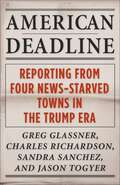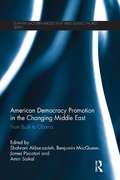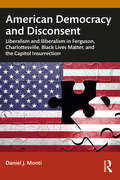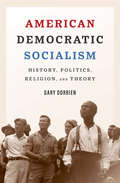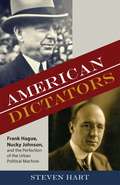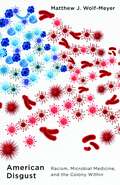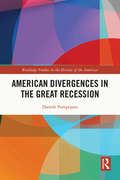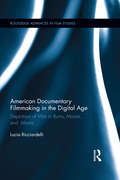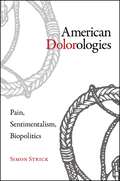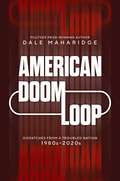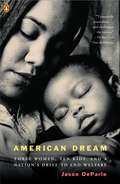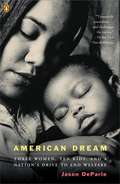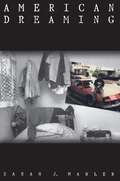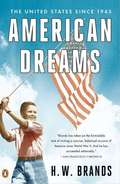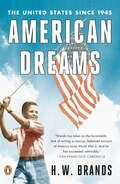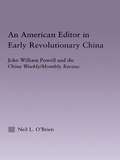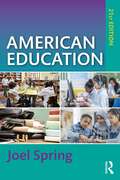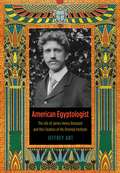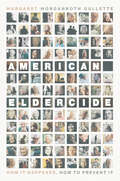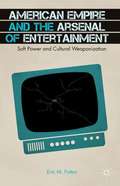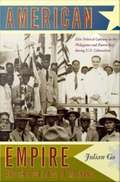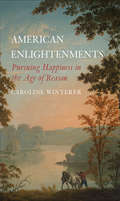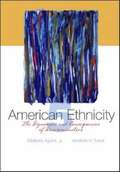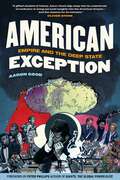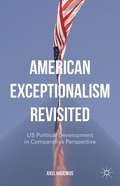- Table View
- List View
American Deadline: Reporting from Four News-Starved Towns in the Trump Era (Columbia Journalism Review Books)
by Charles Richardson Greg Glassner Sandra Sanchez Jason TogyerThe dramatic events of 2020—the presidential election, the COVID-19 pandemic, protests for racial justice—affected every corner of American life. What did these events mean for the residents of small towns and cities that are often overlooked by national newspapers? How do local stories change when they are told by journalists with roots in these communities? And what is lost as this kind of coverage disappears?American Deadline brings together dispatches from four longtime local journalists in different parts of the United States that tell the story of 2020 anew. It shares reporting from Bowling Green, Virginia; Macon, Georgia; McKeesport, Pennsylvania; and McAllen, Texas—two towns that lost their local newspapers and two where they are barely hanging on. The authors consider what makes each town distinctive and how these local perspectives tell a part of a broader American story. This book reports on how residents of these towns grapple with and talk about issues relating to race, schooling, health, immigration, deindustrialization, as well as local and national politics amid a changing and increasingly precarious information ecosystem. A distinct and intimate look at a calamitous year, American Deadline is an important book for all readers interested in the possibilities and future of local journalism.
American Democracy Promotion in the Changing Middle East: From Bush to Obama (Durham Modern Middle East and Islamic World Series)
by Amin Saikal Shahram Akbarzadeh James Piscatori Benjamin MacQueenThe recent "Arab spring", with its popular uprisings in many Arab countries, has exposed the ambiguity at the heart of American promotion of democracy in the Middle East. The US invasions of Afghanistan and Iraq were packaged as democracy promotion, as heralding the beginning of a new phase in the politics of the Middle East when democracy would replace authoritarian regimes. Many of these authoritarian regimes, however, were sustained by US support. The recent popular uprisings threaten to bring democracy without promotion by the US, and threaten to overthrow regimes previously supported by the US and important for US strategy in the region – hence an initial hesitant response by the US to some of the uprisings. This book explores the contradictions in American democracy promotion in the Middle East. It discusses the principles underlying US democracy promotion, and the debates surrounding US policy formation, and examines the application of US democracy promotion in specific cases. It concludes by assessing the likely future patterns of US engagement with democratic reform in the Middle East.
American Democracy and Disconsent: Liberalism and Illiberalism in Ferguson, Charlottesville, Black Lives Matter, and the Capitol Insurrection
by Daniel MontiThis volume is a thorough re-examination of civil unrest and discontent in the United States, particularly the intersection of democracy and violence. The work argues that unrest and violence are embedded rituals of social and political "disconsent" and are constitutive features of citizen-based democracy.As such, they are part of how democratic life works: unrest is the eruptive, visible grammar of citizens in a democratic society. Democracy and citizen unrest and violence in the United States are set within a deeper history. The author traces the roots of American democracy – and the rituals of disconsent – to their sources in ancient Mediterranean political society, demonstrating that early democratic theory and practice understood unrest and revolt as morally grounded. Featuring case studies of recent episodes of political and social "disconsent" in the United States, the volume contextualizes the Black Lives Matter protests, unrest around police and institutional violence, and the Capitol insurrection on January 6.Through this, the book provides an important social theoretical lens through which to understand American discontent around racial injustice, political suppression, and citizen disillusionment.
American Democratic Socialism: History, Politics, Religion, and Theory
by Gary DorrienA sweeping, ambitious history of American democratic socialism from one of the world&’s leading intellectual historians and social ethicists &“Dorrien is supremely qualified for the task he has set himself in this very thoughtful, necessary, and timely book.&”—Maurice Isserman, author of The Other American: The Life of Michael Harrington Democratic socialism is ascending in the United States as a consequence of a widespread recognition that global capitalism works only for a minority and is harming the planet&’s ecology. This history of American democratic socialism from its beginning to the present day interprets the efforts of American socialists to address and transform multiple intersecting sites of injustice and harm. Comprehensive, deeply researched, and highly original, this book offers a luminous synthesis of secular and religious socialisms, detailing both their intellectual and their organizational histories.
American Dictators: Frank Hague, Nucky Johnson, and the Perfection of the Urban Political Machine (Rivergate Regionals Collection)
by Steven HartAmerican Dictators is the dual biography of two of America's greatest political bosses: Frank Hague and Enoch "Nucky" Johnson. The book shows Hague and Johnson at the peak of their power and the strength of their political machines during the years of Prohibition and the Great Depression. Steven Hart describes how both men used their influence to benefit and punish the local citizenry, amass huge personal fortunes, and sometimes collaborate to trounce their enemies.
American Disgust: Racism, Microbial Medicine, and the Colony Within
by Matthew J. Wolf-MeyerExamining the racial underpinnings of food, microbial medicine, and disgust in America American Disgust shows how perceptions of disgust and fears of contamination are rooted in the country&’s history of colonialism and racism. Drawing on colonial, corporate, and medical archives, Matthew J. Wolf-Meyer argues that microbial medicine is closely entwined with changing cultural experiences of digestion, excrement, and disgust that are inextricably tied to the creation of whiteness. Ranging from nineteenth-century colonial encounters with Native people to John Harvey Kellogg&’s ideas around civilization and bowel movements to mid-twentieth-century diet and parenting advice books, Wolf-Meyer analyzes how embedded racist histories of digestion and disgust permeate contemporary debates around fecal microbial transplants and other bacteriotherapeutic treatments for gastrointestinal disease. At its core, American Disgust wrestles with how changing cultural notions of digestion—what goes into the body and what comes out of it—create and impose racial categories motivated by feelings of disgust rooted in American settler-colonial racism. It shows how disgust is a changing, yet fundamental, aspect of American subjectivity and that engaging with it—personally, politically, and theoretically—opens up possibilities for conceptualizing health at the individual, societal, and planetary levels.
American Divergences in the Great Recession
by Daniele PompejanoGlobalization is quite different from internationalization: the by-now global market economy overwhelmed the sovereignty of the old national states. Close to the 2007 crisis, some de-coupling effects were consequent in most developed countries in comparison with the ex-Third World. Latin America seemed to entail a "divergence" with the First World, as unlike the past, it was not hit by the financial crisis, but old historical fragilities invalidated the short positive cycle produced by high international prices. This work deals with this crisis and its basic differences from the older crises of the Thirties and Seventies.
American Documentary Filmmaking in the Digital Age: Depictions of War in Burns, Moore, and Morris (Routledge Advances in Film Studies)
by Lucia RicciardelliAmerican Documentary Filmmaking in the Digital Age examines the recent challenges to the conventions of realist documentary through the lens of war documentary films by Ken Burns, Michael Moore, and Errol Morris. During the twentieth century, the invention of new technologies of audiovisual representation such as cinema, television, video, and digital media have transformed the modes of historical narration and with it forced historians to assess the impact of new visual technologies on the construction of history. This book investigates the manner in which this contemporary Western "crisis" in historical narrative is produced by a larger epistemological shift in visual culture. Ricciardelli uses the theme of war as depicted in these directors’ films to focus her study and look at the model(s) of national identity that Burns, Morris, and Moore shape through their depictions of US military actions. She examines how postcolonial critiques of historicism and the advent of digitization have affected the narrative structure of documentary film and the shaping of historical consciousness through cinematic representation.
American Dolorologies: Pain, Sentimentalism, Biopolitics (SUNY Press Open Access)
by Simon StrickAmerican Dolorologies presents a theoretically sophisticated intervention into contemporary equations of subjectivity with trauma. Simon Strick argues against a universalism of pain and instead foregrounds the intimate relations of bodily affect with racial and gender politics. In concise and original readings of medical debates, abolitionist photography, Enlightenment philosophy, and contemporary representations of torture, Strick shows the crucial function that evocations of "bodies in pain" serve in the politicization of differences. This book provides a historical contextualization of contemporary ideas of suffering, sympathy, and compassion, thus establishing an embodied genealogy of the pain that is at the heart of American democratic sentiment.This book is freely available in an open access edition thanks to Knowledge Unlatched—an initiative that provides libraries and institutions with a centralized platform to support OA collections and from leading publishing houses and OA initiatives. Learn more at the Knowledge Unlatched website at: https://www.knowledgeunlatched.org/, and access the book online at the SUNY Open Access Repository at http://hdl.handle.net/20.500.12648/1705.
American Doom Loop: Dispatches from a Troubled Nation, 1980s–2020s
by Dale MaharidgeMuch of the contemporary crazy can be traced to the 1980s—America of the 2020s is living with the cultural shapeshifting rooted in that decade.Americans lived in a different reality in 1980: Vermont was the only state that let residents carry a concealed firearm without a permit. Twenty-four states now allow this—and numerous other gun laws have fallen by the wayside. When police were accused of wrongdoing, the default answer from society&’s arbiters—courts, politicians, newspaper editors—was: &“The police wouldn&’t lie.&” Editors steered clear of stories about rape and sexual violence. The word &“homeless&” wasn&’t in common use. The fabric of the middle class had not yet begun fraying. America of the 2020s is living with cultural shapeshifting rooted in the 1980s. History, of course, is not a snapshot—it&’s a film. To understand the United States today, we have to know the 1980s. American Doom Loop chronicles the first part of that moving picture, then brings the story forward. As a newspaper journalist, Dale Maharidge had a front-row seat to this decade, immersed in disparate worlds. He was in the Philippines during the last days of Dictator Ferdinand Marcos, witnessing the US lose a critical piece of its empire dating to the Spanish–American War; he traveled to Central America where the East-West conflict was playing out by proxy; he smuggled a Salvadoran family marked by death squads, driving them through trackless desert to the US border; he embedded with a group that was a precursor to the Oath Keepers; and he investigated police, who kept trying to get him fired. Through it all, Maharidge gained an invaluable view of a complicated decade that offers insight into our society today.
American Dream
by Jason DeparleIn this definitive work, two-time Pulitzer finalist Jason DeParle cuts between the mean streets of Milwaukee and the corridors of Washington to produce a masterpiece of literary journalism. At the heart of the story are three cousins whose different lives follow similar trajectories. Leaving welfare, Angie puts her heart in her work. Jewell bets on an imprisoned man. Opal guards a tragic secret that threatens her kids and her life. DeParle traces their family history back six generations to slavery and weaves poor people, politicians, reformers, and rogues into a spellbinding epic. With a vivid sense of humanity, DeParle demonstrates that although we live in a country where anyone can make it, generation after generation some families don't. To read American Dream is to understand why.
American Dream: Three Women, Ten Kids, and a Nation's Drive to End Welfare
by Jason DeparleIn this definitive work, two-time Pulitzer finalist Jason DeParle cuts between the mean streets of Milwaukee and the corridors of Washington to produce a masterpiece of literary journalism. At the heart of the story are three cousins whose different lives follow similar trajectories. Leaving welfare, Angie puts her heart in her work. Jewell bets on an imprisoned man. Opal guards a tragic secret that threatens her kids and her life. DeParle traces their family history back six generations to slavery and weaves poor people, politicians, reformers, and rogues into a spellbinding epic. With a vivid sense of humanity, DeParle demonstrates that although we live in a country where anyone can make it, generation after generation some families don't. To read American Dream is to understand why.
American Dreaming: Immigrant Life on the Margins
by Sarah J. MahlerAmerican Dreaming chronicles in rich detail the struggles of immigrants who have fled troubled homelands in search of a better life in the United States, only to be marginalized by the society that they hoped would embrace them. Sarah Mahler draws from her experiences living among undocumented Salvadoran and South American immigrants in a Long Island suburb of Manhattan. In moving interviews they describe their disillusionment with life in the United States but blame themselves individually or as a whole for their lack of economic success and not the greater society. As she explores the reasons behind this outlook, the author argues that marginalization fosters antagonism within ethnic groups while undermining the ethnic solidarity emphasized by many scholars of immigration. Mahler's investigation leads to conditions that often bar immigrants from success and that they cannot control, such as residential segregation, job exploitation, language and legal barriers, prejudice and outright hostility from their suburban neighbors. Some immigrants earn surplus income by using private cars as taxis, subletting space in apartments to lower rent burdens, and filling out legal forms and applications--in essence generating institutions largely parallel to those of the mainstream society whereby only a small group of entrepreneurs can profit. By exacting a price for what used to be acts of reciprocal good will in the homeland, these entrepreneurs leave people who had expected to be exploited by "Americans" feeling victimized by their own.
American Dreams: The United States Since 1945
by H. W. BrandsTHE STORY OF OUR NATION FROM THE A - BOMB TO THE iPHONE <p><p>For a brief moment in 1945, America stood at its apex, looking back on victory not only against the Axis powers but also against the Great Depression, and looking ahead to a seemingly limitless future. What we've done in the six decades since is a vitally important and fascinating topic that has rarely been tackled in one volume. Covering the highs and lows, politics to pop culture, H. W. Brands, one of today's preeminent historians, creates a character-driven narrative that chronicles the great themes and events that have driven America-a still unfolding legacy of dreams born out of a global cataclysm. <p> 'A crisp, balanced account of America. ' - THE ECONOMIST <p> 'Brands weaves together keen political history with anecdote and marvellous sense of place to produce a vivid tableau. ' - THE BOSTON GLOBE <p> 'Brands knows how to write narrative and how to make the complex comprehensible. ' - JONATHAN YARDLEY, THE WASHINGTON POST BOOK WORLD
American Dreams: The United States Since 1945
by H. W. BrandsFrom bestselling historian H. W. Brands, an incisive chronicle of the events and trends that guided-and sometimes misguided-our nation from the A-bomb to the iPhone. For a brief, bright moment in 1945, America stood at its apex, looking back on victory not only against the Axis powers but against the Great Depression, and looking ahead to seemingly limitless power and promise. What we've done with that power and promise over the past six decades is a vitally important and fascinating topic that has rarely been tackled in one volume, and never by a historian of H. W. Brands's stature. As American Dreams opens, Brands shows us a country dramatically different from our own-more unequal in social terms but more equal economically, more religious and rural but also more liberal and more wholeheartedly engaged with the rest of the world. As he traces the changes we have gone through as a nation, he reveals the great themes and dreams that have driven America-the rising focus on individual rights and pleasures, the growing distance between our global goals and those of the rest of the world, and the inexorable dissolution of a shared sense of what it means to be American. In Brands's adroit hands, these trends unfold through a character-driven narrative that sheds brilliant light on the obvious highs and lows-from Watergate to the Berlin Wall, from Apollo 11 to 9/11, from My Lai to shock and awe. But he also chronicles the surprising impact of less celebrated events and trends. Through his eyes, we realize the sweeping significance of the immigration reforms of the 1960s, which gradually transformed American society. We come to grasp the vast impact of abandoning the gold standard in 1971, which enabled both globalization and the current financial crisis. We ponder the unnerving results of CNN's debut in 1979, which sped up the news cycle and permanently changed our foreign policy by putting its effects live on our TV screens. Blending political and cultural history with his keen sense of the spirit of the times, Brands captures the national experience through the last six decades and reveals the still-unfolding legacy of dreams born out of a global cataclysm.
American Editor in Early Revolutionary China: John William Powell and the China Weekly/Monthly Review
by Neil O'BrienThis is a study of Sino-American relations and the editorial policy of the China Weekly Review / China Monthly Review , published in Shanghai by John William Powell during the Chinese Civil War and the Korean War. The Review supported US attempts in early 1946 to avert civil war through the creation of a coalition government. By 1947 it reflected growing disillusionment with Guomindang policies, and increasing sympathy for the demands of impoverished students and faculty for multi-party democracy and peace. As the Civil War shifted in favour of the Communists in late 1948, Powell and the Review counseled US businessmen to remain in Shanghai and urged the US government to establish working relations with the Communists, and later to recognize the new regime. Staying in Shanghai to report changes engendered by the Communist victory, the Review 's staff accomodated themselves to the new orthodoxy and to the regime's coordination of the press. During the Korean War, the Review opposed the expanding US air war, becoming the foremost American purveyor of Chinese and North Korean allegations of American use of bacteriological weapons. The Review was also utilized for the political indoctrination of US prisoners-of-war by the Chinese and North Koreans. After closing the Review in July 1953 and returning to the United States, Powell, his wife Sylvia Campbell and assistant editor Julian Schuman were put on trial for sedition. As the government narrowed its focus to the bacteriological warfare issue, Powell and his lawyers countered by trying to prove the veracity of the charges, seeking witnesses in China and North Korea. Adverse publicity led to a mistrial in January 1959 and limitations in both the sedition and treason statutes ended plans to renew prosecution. Powell and the Review had insisted that positive diplomatic and economic relations between China and the United States were both possible and desirable. The gradual normalization of trade, investment and political relations since the 1970s seemed to validate this belief. In the post-Cold War age when Sino-American relations are often strained and tempestuous, this book serves as a reminder of the value of making the extra effort to achiece understanding.
American Education (Sociocultural, Political, and Historical Studies in Education)
by Joel SpringFeaturing current information and challenging perspectives on the latest issues and forces shaping the American educational system—with scholarship that is often cited as a primary source—Joel Spring introduces readers to the historical, political, social and legal foundations of education and to the profession of teaching in the United States. In his signature straightforward, concise approach to describing complex issues, he illuminates events and topics that are often overlooked or whitewashed, giving students the opportunity to engage in critical thinking about education. Students come away informed on the latest topics, issues and data and with a strong knowledge of the forces shaping the American educational system. Updated throughout, the 21st edition of this clear, authoritative text remains fresh and up-to-date, reflecting the many changes in education that have occurred since the publication of the previous edition. New coverage includes: Discussion of “culture wars” and critical race theory Parental rights versus the goals of common education LGBTQIA+ students’ rights Discussion of the current administration’s educational policies
American Egyptologist: The Life of James Henry Breasted and the Creation of His Oriental Institute
by Jeffrey AbtJames Henry Breasted (1865-1935) had a career that epitomizes our popular image of the archaeologist. Daring, handsome, and charismatic, he traveled on expeditions to remote and politically unstable corners of the Middle East, helped identify the tomb of King Tut, and was on the cover of Time magazine. But Breasted was more than an Indiana Jones--he was also an accomplished scholar, academic entrepreneur, and talented author who brought ancient history to life not just for students but for such notables as Teddy Roosevelt and Sigmund Freud. In American Egyptologist, Jeffrey Abt weaves together the disparate strands of Breasted's life, from his small-town origins following the Civil War to his evolution into the father of American Egyptology and the founder of the Oriental Institute in the early years of the University of Chicago. Abt explores the scholarly, philanthropic, diplomatic, and religious contexts of his ideas and projects, providing insight into the origins of America's most prominent center for Near Eastern archaeology. An illuminating portrait of the nearly forgotten man who demystified ancient Egypt for the general public, American Egyptologist restores James Henry Breasted to the world and puts forward a brilliant case for his place as one of the most important scholars of modern times.
American Eldercide: How It Happened, How to Prevent It
by Margaret Morganroth GulletteA bracing spotlight on the avoidable causes of the COVID-19 Eldercide in the United States. Twenty percent of the Americans who have died of COVID since 2020 have been older and disabled adults residing in nursing homes—even though they make up fewer than one percent of the US population. Something about this catastrophic loss of life in government-monitored facilities has never added up. Until now. In American Eldercide, activist and scholar Margaret Morganroth Gullette investigates this tragic public health crisis with a passionate voice and razor-sharp attention to detail, showing us that nothing about it was inevitable. By unpacking the decisions that led to discrimination against nursing home residents, revealing how governments, doctors, and media reinforced ageist or ableist biases, and collecting the previously little-heard voices of the residents who survived, Gullette helps us understand the workings of what she persuasively calls an eldercide. Gullette argues that it was our collective indifference, fueled by the heightened ageism of the COVID-19 era, that prematurely killed this vulnerable population. Compounding that deadly indifference is our own panic about aging and a social bias in favor of youth-based decisions about lifesaving care. The compassion this country failed to muster for the residents of our nursing facilities motivated Gullette to pen an act of remembrance, issuing a call for pro-aging changes in policy and culture that would improve long-term care for everyone.
American Empire and the Arsenal of Entertainment
by Eric M. FattorMovies, television, and American culture permeates even the most remote reaches of the globe in unprecedented levels. What affect does the spread of the American zeitgeist have on global perceptions of the US? This book analyzes the complex role entertainment plays in foreign policy - weighing its benefits and setbacks to national interests abroad.
American Empire and the Politics of Meaning: Elite Political Culture in the Philippines and Puerto Rico During U.S. Colonialism
by Julian GoWhen the United States took control of the Philippines and Puerto Rico in the wake of the Spanish-American War, it declared that it would transform its new colonies through lessons in self-government and the ways of American-style democracy. In both territories, U. S. colonial officials built extensive public school systems, and they set up American-style elections and governmental institutions. The officials aimed their lessons in democratic government at the political elite: the relatively small class of the wealthy, educated, and politically powerful within each colony. While they retained ultimate control for themselves, the Americans let the elite vote, hold local office, and formulate legislation in national assemblies. American Empire and the Politics of Meaning is an examination of how these efforts to provide the elite of Puerto Rico and the Philippines a practical education in self-government played out on the ground in the early years of American colonial rule, from 1898 until 1912. It is the first systematic comparative analysis of these early exercises in American imperial power. The sociologist Julian Go unravels how American authorities used "culture" as both a tool and a target of rule, and how the Puerto Rican and Philippine elite received, creatively engaged, and sometimes silently subverted the Americans' ostensibly benign intentions. Rather than finding that the attempt to transplant American-style democracy led to incommensurable "culture clashes," Go assesses complex processes of cultural accommodation and transformation. By combining rich historical detail with broader theories of meaning, culture, and colonialism, he provides an innovative study of the hidden intersections of political power and cultural meaning-making in America's earliest overseas empire.
American Enlightenments: Pursuing Happiness in the Age of Reason
by Caroline WintererA provocative reassessment of the concept of an American golden age of European-born reason and intellectual curiosity in the years following the Revolutionary War The accepted myth of the "American Enlightenment" suggests that the rejection of monarchy and establishment of a new republic in the United States in the eighteenth century was the realization of utopian philosophies born in the intellectual salons of Europe and radiating outward to the New World. In this revelatory work, Stanford historian Caroline Winterer argues that a national mythology of a unitary, patriotic era of enlightenment in America was created during the Cold War to act as a shield against the threat of totalitarianism, and that Americans followed many paths toward political, religious, scientific, and artistic enlightenment in the 1700s that were influenced by European models in more complex ways than commonly thought. Winterer's book strips away our modern inventions of the American national past, exploring which of our ideas and ideals are truly rooted in the eighteenth century and which are inventions and mystifications of more recent times.
American Ethnicity: The Dynamics and Consequences of Discrimination (5th Edition)
by Jonathan H. Turner Adalberto Aguirre Jr.This text introduces the dynamics of racial and ethnic relations.
American Exception: Empire and the Deep State
by Aaron GoodAmerican Exception seeks to explain the breakdown of US democracy. In particular, how we can understand the uncanny continuity of American foreign policy, the breakdown of the rule of law, and the extreme concentration of wealth and power into an overworld of the corporate rich. To trace the evolution of the American state, the author takes a deep politics approach, shedding light on those political practices that are typically repressed in &“mainstream&” discourse. In its long history before World War II, the US had a deep political system—a system of governance in which decision-making and enforcement were carried out within—and outside of—public institutions. It was a system that always included some degree of secretive collusion and law-breaking. After World War II, US elites decided to pursue global dominance over the international capitalist system. Setting aside the liberal rhetoric, this project was pursued in a manner that was by and large imperialistic rather than progressive. To administer this covert empire, US elites created a massive national security state characterized by unprecedented levels of secrecy and lawlessness. The &“Global Communist Conspiracy&” provided a pretext for exceptionism—an endless &“exception&” to the rule of law. What gradually emerged after World War II was a tripartite state system of governance. The open democratic state and the authoritarian security state were both increasingly dominated by an American deep state. The term deep state was badly misappropriated during the Trump era. In the simplest sense, it herein refers to all those institutions that collectively exercise undemocratic power over state and society. To trace how we arrived at this point, American Exception explores various deep state institutions and history-making interventions. Key institutions involve the relationships between the overworld of the corporate rich, the underworld of organized crime, and the national security actors that mediate between them. History-making interventions include the toppling of foreign governments, the launching of aggressive wars, and the political assassinations of the 1960s. The book concludes by assessing the prospects for a revival of US democracy.
American Exceptionalism Revisited
by Axel HadeniusAmerican Exceptionalism Revisited provides a broad overview of the various features that signify American politics. These include the upholding of an exceptional political stability, involving a particular balance between legislative, executive and judicial powers, and the permanence of a unique party system. Furthermore, special traits in the electoral realm'e. g. , voter turnout, the inflow of money, and the application of primaries'are targets of analysis. Through comparisons with conditions applying abroad, particularly in Europe and Latin America, Axel Hadenius reveals a number of new insights on American political life, both today and over time
